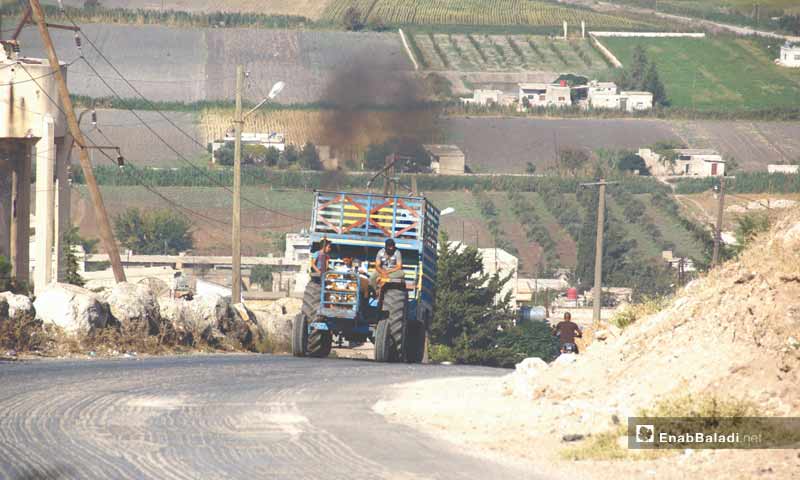



“After applying for a job at the organizations and the foundations spreading throughout Northern Syria, I found someone to recommend me to one of these entities, says Akaram, 24 years old young man, adding that “despite the recommendation, which one of my acquaintances made, I have been waiting for a month and a half to be accepted for the new job or refused because a recommendation better than mine has reached [the foundation].”
Akaram Ajana is an activist from Eastern Ghouta; he arrived at Northern Syria after the reconciliation deals were conducted with the Syrian regime last March. After all his attempts at entering Turkey in an illegal manner failed, he decided to stay inside Syria, choosing to settle down in the city of Afrin, as it is the safest, where he is searching for a job, according to what he has told Enab Baladi.
Akram’s plan faced the obstacle of finding a job, so he presented his resume to dozens of foundations, as he put it, which have met him either with refusal or disregard.
Abu Obada, a displaced activist from Ghouta, suffers the same problem, telling Enab Baladi about the reasons that minimize the job opportunities at local organizations for the people seeking them. The first of these is the university degree which a large number of the Ghouta’s young people were deprived from during the long siege that their area suffered.
Abu Obada, a fourth-year law student, believes that favoritism is the major reason for the obstacle facing the young people seeking job opportunities, especially that the labour market is a massive one.
Dozens of displaced young people were forced to go to Turkey, , thinking that they will find more opportunities, pointing out that in Northern Syria degree holders and competent young people are yet out of jobs.
Khalid al-Rifee agrees with Abu Obada’s opinion about the problem of the displaced people’s employment, especially students and degree holders, saying that it is a major problem.
In an interview with Enab Baladi he said that many people abandoned education due to war, and some of them graduated and could not find jobs, adding that “the majority of the displaced people, competent ones in particular are so far out of jobs,” at a time where the rentals and the living costs are on the rise.
“The organizations, local and provincial councils re undertaking no action to solve this problem,” he said.
Official statements about the problem of unemployment are lacking, with them statistics about the rates of unemployment in the opposition-controlled areas. However, many organizations which function in Northern Syria have launched various initiatives as to find solutions to generate additional job opportunities for young people.
The ”People in Need” organization, functioning in the field of relief in the two governorates of Idlib and Aleppo since 2012, has triggered the “Money for Work” program, which it started implementing four months ago in rural Aleppo, in a trial period of three months, which was followed by another, covering the city of Aleppo, the part under the control of the “Free Army.”
The “Himam” (Enthusiastic Efforts) Organization has contributed in the “Money for Work” project, as an executive partner in the city of Aleppo, according to the Organization’s director Bakri al-Zain, who explained that the project includes 150 young men and women.
The young men are divided into nine groups, who perform tasks such as cleaning roads, removal of dirt caused by the regime’s shelling, the restoration and rehabilitation of public facilities, in addition to simple water and electricity networks related maintenance jobs which have been destroyed by bombardment and which do not require heavy equipment, as well as offering help to the relief offices at their neighborhoods.
As for the young women, Bakri explained that the organization provided the salaries of four women who worked for the Women Forensic Medicine Center, whose job is bathing the bodies of the dead women and forensic and medical documentation, in addition to teachers who work at four kindergartens, which receive no funding, three of which are at the eastern neighborhoods and the fourth is at the al-Mashhad neighborhood, western Aleppo.
About the sustainability of the project, Bakri said: “The experience of rural Aleppo was successful, the numbers of beneficiaries and the areas offered services increased. Thus, opening new fields for opportunities and the number of employed young people at the city of Aleppo depends on the degree of the experience’s successes in the context of the particular conditions that the city is living.”
Idlib is a house for the people who have been displaced from the different parts of Syria, who left their areas under the reconciliation agreements which the regime and Russia signed with the Syrian opposition, the last of which took place at rural Idlib, Daraa, and eastern Ghouta.
According to the census conducted by the “Response Coordinators” gathering, the population in Northern Syria has almost reached the four million persons mark.
In Idlib governorate, there are three million and 867 thousand persons, according to the statistics published by the organization on August 12, pointing out that the numbers covered Idlib governorate, the western rural parts of Aleppo and the southern rural parts of Hama.
The population’s combination in Northern Syria is divided as follows:
According to statistics, 58% are the original residents of the area, the number of whom is two million and two hundred thousand persons.
As for the people displaced from other governorates, they constitute 21% of the population in the area where the census was conducted, the number of whom is 829 thousand persons, while the number of the displaced people who are based in the camps is the equivalent to 791 thousand persons, 20% of the area’s population.
The number of the Palestinian and Iraqi refugees in the area is 19850 persons, 1% of the population.
if you think the article contain wrong information or you have additional details Send Correction